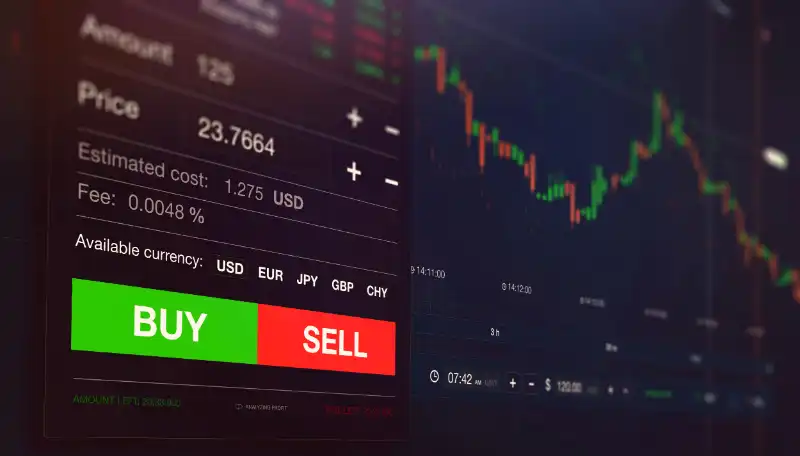This post is going to be talking about the Forex Market, how it works, and what you need to keep in mind before starting to trade there.
What is Forex Trading?
Forex is an abbreviation or short form for foreign exchange, which is the exchange of one currency for another. This procedure can be carried out for a variety of reasons, including commercial, tourism, and international trade.
Forex is exchanged on the forex market, which is open 24 hours a day5 days in ever week, to buy and sell currencies and is utilized by banks, corporations, investment firms, hedge funds, and retail traders.
How does Forex trading work? This is a question a lot of beginner traders ask themselves. Here is the simple and easy answer to that.
With an estimated average global daily turnover of more than US$6.5 trillion — up from $5 trillion just a few years ago — the forex market is by far the largest and most liquid financial market in the world.
The fact that there is no central marketplace or exchange in a central location is a critical element of the forex market, as all trading is done electronically over computer networks. This is referred to as an over-the-counter (OTC) market.
This market is open 24 hours a day. Currencies are traded in practically every time zone in the major financial capitals of Frankfurt, Hong Kong, London, New York, Paris, Singapore, Sydney, Tokyo, and Zurich.
This implies that when the trading day in the United States finishes, the forex market opens in Tokyo and Hong Kong. As a result, the currency market can be very active at any time, with price quotes changing all the time.
The FX market is the world’s only fully continuous and continuously trading market. Historically, the forex market was dominated by institutional corporations and major banks acting on behalf of their clients. But – in very recent years, it has become increasingly retail-oriented, with traders and investors of all sizes participating.
Things to Keep in Mind For Forex Trading
a) Currency Pairs
It is critical to be knowledgeable about the currency pairs in which you trade. Various pairs perform differently, and you must be aware of the markets underlying those currencies in order to stay informed of any significant events in those countries.
Currency as an asset class has two unique characteristics:
- You can profit from the difference in interest rates between two currencies.
- You can profit from currency fluctuations.
Hence, by buying the currency with the higher interest rate and shorting the currency with the lower interest rate, you can profit from the difference between two interest rates in two distinct economies.
b) Leverage
Leverage is borrowed money that can be your best friend or your worst enemy. On the plus side, it enables you to conduct high-volume deals with a small number of funds. Yet, excessive leverage combined with trading losses can make it difficult to return the borrowed funds.
c) The Bid asks Spread
In forex trading, the bid-ask spread is extremely important. It is essentially the gap between the lowest and highest sell prices. A wider spread may imply less liquidity and vice versa. Keep a close eye on the spread and plan your transactions accordingly.
d) Look Out for Trading Strategies Out There
While trading currencies, there are numerous forex techniques to consider. There are several tactics you can rely on, depending on market movements and your trading objectives, ranging from scalping and day trading to trend trading and swing trading.
e) Your Plans are a Definite
You should also have a trading plan in place so that you can execute your transactions objectively and with knowledge. A plan also ensures that you keep your trading objectives in mind before you purchase or sell foreign currency.
f) Keep Your Biases Aside
Finally, make sure to keep your emotions and biases out of the equation. The currency market is extremely volatile, and it is easy to become overwhelmed. Despite the numerous price swings, it is critical to maintaining objectivity and impartiality.
Other Ways to Use the Forex Markets
a) For Speculations
Interest rates, trade flows, tourism, economic strength, and geopolitical risk all influence currency supply and demand, resulting in daily volatility in the FX markets. This gives opportunities to profit from changes in the value of a particular currency relative to another. A projection of one currency falling is effectively the same as predicting the other currency in the pair would rise.
As a result, a trader anticipating price movement might short or long one of the currencies in a pair and profit from it.
b) For Hedging
Businesses conducting business in other nations are vulnerable to currency swings when they acquire or sell goods and services outside of their native market. Foreign exchange markets enable currency risk to be hedged by establishing a rate at which the transaction will be executed. A trader can lock in an exchange rate by buying or selling currencies in advance in the forward or swap markets.
Locking in the exchange rate allows them to reduce losses or raise gains based on which currency in a pair is stronger or weaker.
Conclusion
These factors can help you get a good kick start in the Forex market, and you also have to remember this market is very volatile. You can’t take your eyes off it. Also, only invest what you have left. Investments in a highly risky market need to be made cautiously and carefully.

